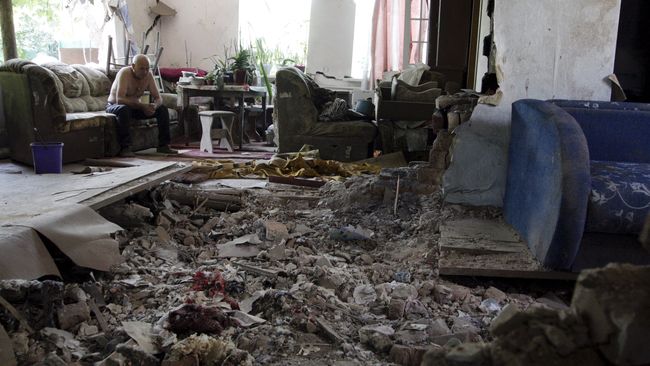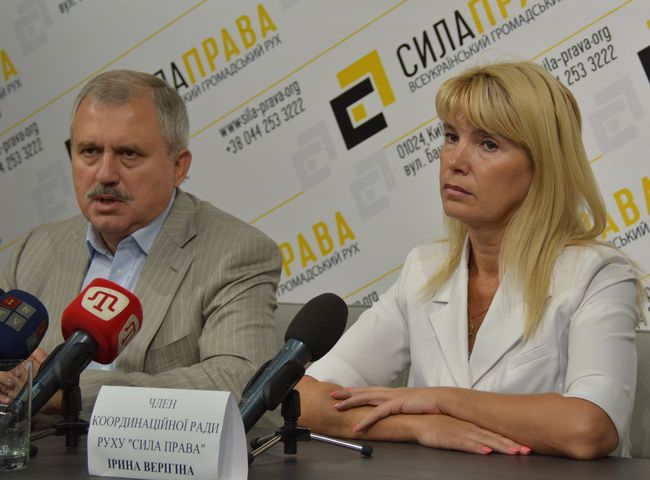Russia receives “first bill”
Andrii SENCHENKO: “Public initiative and media support are very important factors, from a juridical angle, in the struggle against the aggressor”
On Tuesday, Crimea House hosted a press conference of Andrii Senchenko, head of the all-Ukrainian civic movement “Force of Law,” and the coordination board member Iryna Verihina who spoke as a Ukrainian who had suffered from the Russian aggression because she is a forced migrant from the occupied part of the Donbas. The conference made public for the first time the text of a court ruling to recover 40,000-euro-worth damages from the Russian Federation in favor of Iryna Verihina.
As a matter of fact, Ms. Verihina personifies more than two million Ukrainian citizens who have not only lost their housing and property, but have also become direct victims of the Kremlin’s act of aggression. “Force of Law” lawyers are persistently and unceasingly working on the problem of compensating the victims of Russian aggression for their losses. The press conference participants informed the audience about transition to the second stage of the legal strategy aimed at recovering moral and material damages, which Senchenko says is the “first bill” to be presented to Russia. All the next lawsuits are supposed to be filed in the same manner. For this reason, “Force of Law” is honing all the juridical and processional points down to the finest detail. This also means that Russia has the right to appeal against these decisions, although the Russia side’s tactic is to completely ignore this kind of court rulings. While previously it took courts a long time to hand down a ruling, the next lawsuits will be considered much faster.
It will be recalled that Verihina requested Kyiv’s Holosiivsky District Court on March 4 to establish a jural fact that she became a forced migrant as a result of the Russian armed aggression and occupation of a part of Luhansk oblast. On March 18 the court established the jural fact of the claimant’s forced resettlement, emphasizing that this was caused by the Russian armed aggression. On May 27, at the same court, the claimant sued Russia, as an aggressor state, for damages. Let us underline that this fact should “trigger a chain reaction,” as far as other victims are concerned. On May 30, the abovementioned court impounded a 3-billion-dollar Russian loan which Senchenko says “was taken by a criminal president and has already been spent.” The Ukrainian court ruled “to discontinue making payments to Russia under a 3-billion-dollar loan and the accrued interest in compliance with the trust agreement signed by the Minister of Finance on behalf of Ukraine and the company Law Debenture Trust Corporation Plc. on December 24, 2013.”

BY TAKING ACTIVE AND PERSISTENT ACTIONS, THE “FORCE OF LAW” HUMAN RIGHTS MOVEMENT HAS ACHIEVED THE FIRST POSITIVE RESULTS IN THE RECOVERY OF DAMAGES CAUSED BY THE RUSSIAN AGGRESSION / Photo from the website SILA-PRAVA.ORG
The very fact of this decision against Russia in favor of the claimant plus the “blocking” of the humiliating obligation to pay the debt (for Russia has inflicted on Ukraine the damage that is sometimes difficult to assess, not to mention the loss of more than 10,000 residents and some territories) is an extremely important precedent by which the entire judicial and political system should be guided. The total damage Russia has inflicted on Ukrainian citizens is more than 100 billion US dollars. Senchenko points out that this and other figures in lawsuits have not been “spun out of thin air.” They were estimated on the basis of European Court of Human Rights practices.
The Day asked a question about a likely contradiction between the ruling of Kyiv’s Holosiivsky District Court, which forbade the Ukrainian side to pay “the Yanukovych debt,” and the expected ruling of London’s High Court, Queen’s Bench Division, to which the Russian Federation filed a suit. Senchenko has no doubts that Ukraine will lose the case in London. He explained the mechanism the Ukrainian side should adopt: “There will be two conflicting rulings. Russia sued the state of Ukraine and expects the London court to confirm its right to demand that we pay the loan and the interest, which amounts to much more than three billion. Unfortunately, I must say right now that Ukraine will lose this case, for the fact that Ukrainians elected a criminal president cannot be an argument for the London court. Now we must make the London court delay its decision, while Ukrainian courts should hand down legally valid rulings on the basis of claims from Ukrainian aggrieved parties. If the state of Russia was suing Ukraine in London and Ukraine was suing Russia in Kyiv, the judges would, naturally, make conflicting decisions. And the rulings of Ukrainian judges would then look funny. But if our claimant is a concrete aggrieved citizen of Ukraine, not the state of Ukraine, there is no conflict in this case. It is very important that, by the time the state of Ukraine loses the case in London and Russia gains an undoubted right to receive the abovementioned sum of money from the state of Ukraine, Ukrainian citizens should have won their suits against Russia. This will bring into play the procedure of obeying the court ruling at the expense of this money. I emphasize that this does not run counter to the London court’s likely decision.”
Finally, on August 23 this year, Kyiv’s Holosiivsky District Court ruled “to recover an amount equivalent to 40,000 euros from the state of the Russian Federation in favor of Iryna Verihina.” Under the law, the Russian side can appeal within 10 days.
But, surprisingly enough, the official side has put up obstacles to these deeds, even though the “Force of Law” civic movement initiates and practically carries out a timely and indispensable struggle against the Kremlin in the juridical field. Senchenko says that the Presidential Administration and some judges are slowing down the process. In particular, he named a number of judges who refused even to look into the lawsuits under absolutely formalistic and groundless pretexts. Senchenko stresses that it is not about disputes over the essence of claims, for this kind of disputes are to be settled in courts of appeal. It is about a biased attitude of some judges to the very fact of a claim. Verihina said in turn that if “judges do not recognize the fact of Russian aggression by their actions, they must not be judges.” Senchenko himself calls this behavior of the judiciary as “judicial desertion.” In addition to the fact that some judges hinder the consideration of lawsuits, “Force of Law” sometimes finds no understanding in business circles. The point is that, for lawsuits to be properly accepted, there must be a ramified network of representations and media support in order to adequately explain the expediency of such suits to migrants, military servicemen, and their relatives. Also noteworthy is the apathy of Ukrainian officials, even of a very high rank, who take a sluggish attitude to “Force of Law” initiatives. For example, Senchenko has been in contact with Foreign Minister Pavlo Klimkin for nine months by phone only – without practical results or a personal meeting. The same applies to other officials who only pretend to be interested in this topical issue. The behavior of officials is particular in that they are very good at making high-sounding statements and declarations about Russian aggression, but they are in fact slowing down the process of juridical face-off. Incidentally, Russia established long ago a system of accepting petitions from Donbas migrants about “crimes” of the Ukrainian army. It is no accident that Russia is intimidating Ukraine with not only the concentration of forces, but also lawsuits against the high military command. While Ukraine’s juridical efforts are confined to the initiatives of certain individuals and organizations, in Russia this sector has long been under close scrutiny of the government.
Besides, Senchenko said that the Verkhovna Rada must solve two urgent problems. The first is that, under the Ukrainian law, migrants are supposed to submit suits to Kyiv’s Solomiansky Court. This formal norm hampers the practical submission of suits, for it is a question of millions of people. The second is a too high court fee which is unlikely to be compensated in the near future. Ordinary migrants, who receive lukewarm support from the state in any case, are unable to pay these costs. Therefore, Senchenko proposes making some amendments to the law, whereby there should be a zero court fee for those who have suffered from another country’s aggression or a natural calamity.
It should be noted in conclusion that lawsuits against Russia must not only be aimed at restoring justice with respect to individuals, but also have prospects for the distant future. We know a thorny path to the recognition of the 1932-33 Holodomor as genocide, while some other tragic points in history are still a matter of speculation, also on the international arena. Unless the imperial-style occupational regime is punished, unless the sources of aggression and concrete culprits are defined in clear-cut legal terms, the Ukrainian people, nation, and state will remain vulnerable not only to history-twisting, but also to new attempts to destroy our subjectness. As the 300-year-long historical path shows, the price of it is the loss of not only statehood, but also millions of human lives.
Newspaper output №:
№48, (2016)Section
Day After Day





